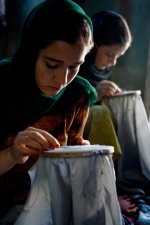CARE Global Report Cites Importance of Empowering Poor Women

The two daughters of Sayed Bibi, who was widowed when here husband was killed when they fled from Taliban attacks in Shamoli ten years ago,sew burkas to make a living at their home in District 7 of Kabul, Afghanistan, on the 30th September, 2009. Thousands of women like Sayed have been widowed throughout Afghanistan and … Continued
Photo Credit:CARE
March 8th, is International Women’s Day.
Since 1911 it’s a day to honor, promote and recognize various campaigns for women’s rights.
Tonight in Atlanta, officials with the international organization CARE are hosting a panel discussion on empowering women and the impact it has on raising healthier children.
WABE’s Rose Scott has more.
Officials with CARE co-authored a study that measured the effectiveness of empowering women in one of the poorest countries in the world.
Doris Bartel was involved in the study, “Bangladesh is a poor country and it has a lot of malnutrition and stunting of the children which means the children aren’t as tall for the age as they should be”
Bartelheads CARE’s gender and empowerment division.
She says there were various factors that contributed to what the study calls gender inequalities facing poor Bangladesh women, “they were issues related to households roles, expectations about who does what at the household level, who’s expected to do what outside the household in terms of brining in an income or going to a job or finding some lively hood.”
So over a four year period, some of the women chose to participate in what the study labeled empowerment interventions.
They came together to talk about changes needed in their community.
They got involved in programs gearing towards embracing and empowering women.
There was even a program on combating sexual harassment.
Then over the course of the study, children of those women didn’t suffer from malnutrition, “in those four years the stunting rate fell twenty-eight percent for children ages 6 months to 24 months” says Bartel.”
The problem of gender inequality is not unique to poor women and girls of Bangladesh.
Bartel says at the end of the program the women had questions of their own.
They asked, “can you tell if women are getting paid the same as men in your country?”
Bartel replied, “well, actually the wage difference is still not exactly equal and they said uh-huh.”
They also asked about another issue that torments women on a global scale, “is domestic violence an issue in your county?”
Bartel told the women domestic violence is an issue for American women, “I said well you know what we’re all in the same world and were all facing the same kinds of issues.”
According to CARE, women and girls make up 70-percent of the 1-billion people trying to survive on dollar a day.
9(MDAxODM0MDY4MDEyMTY4NDA3MzI3YjkzMw004))








